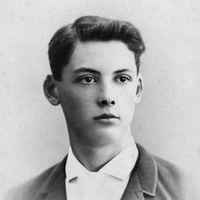The Voice of Age
SHE’D look upon us, if she could,
As hard as Rhadamanthus would;
Yet one may see,—who sees her face,
Her crown of silver and of lace,
Her mystical serene address
Of age alloyed with loveliness,—
That she would not annihilate
The frailest of things animate.
She has opinions of our ways,
And if we’re not all mad, she says,—
If our ways are not wholly worse
Than others, for not being hers,—
There might somehow be found a few
Less insane things for us to do,
And we might have a little heed
Of what Belshazzar couldn’t read.
She feels, with all our furniture,
Room yet for something more secure
Than our self-kindled aureoles
To guide our poor forgotten souls;
But when we have explained that grace
Dwells now in doing for the race,
She nods—as if she were relieved;
Almost as if she were deceived.
She frowns at much of what she hears,
And shakes her head, and has her fears;
Though none may know, by any chance,
What rose-leaf ashes of romance
Are faintly stirred by later days
That would be well enough, she says,
If only people were more wise,
And grown-up children used their eyes.

